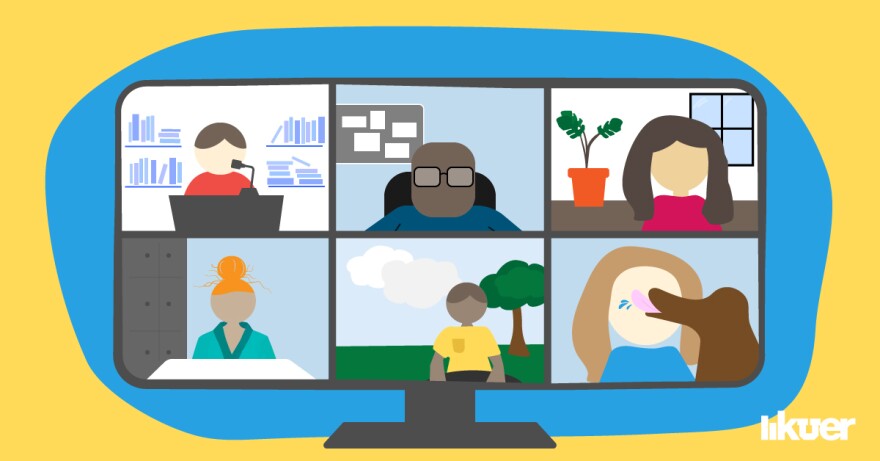Accidental cross talk on video calls has become common for many Utahns now working at home. But things can get a whole lot more complicated when politicians and governmental bodies hold public meetings virtually.
At a recent Salt Lake County Council meeting, councilmembers did an out-of-sync Pledge of Allegiance, which ended in laughter. The Salt Lake City Council has had technological glitches when trying to listen to virtual public comment.
The City Council started holding on-line meetings almost three weeks ago: more than a dozen public commenters and all seven council members pile on to a Webex call, which is also live streamed on social media.
Councilmember Darin Mano, one of two members who has tested positive for COVID-19, said he was glad the city has the technology to keep the wheels of government moving and that he can still participate.
“Both Tuesdays that we had council meetings were good days for me,” Mano said. “I was feeling pretty good. And I don't feel like the symptoms from coronavirus impeded my ability to participate in those meetings.”
But, there are things he misses about conducting business in person.
“In a normal meeting, you start to see the reactions to different comments,” Mano said. “I at least want to consider what the constituents are thinking when we're making decisions on zoning issues or whatever the case may be.”
In-person public comment isn’t an option right now. When there’s a declared emergency, the city’s requirement to have a physical location for the meeting goes away. Additionally, Gov. Gary Herbert issued an executive order on March 18 suspending the requirement for a physical location statewide.
Security Concerns
As politics have moved online, there’s also been some unwelcome public input.
There’s a new phenomenon, sometimes called “Zoombombing,” where hackers will take over virtual meetings and display obscene images. That recently happened to a meeting between a Pleasant Grove elementary school principal and about 40 students.
“It's quite a problem that we're seeing around the country right now,” Salt Lake City Chief Information Security Officer Jason Struck said.
But the City Council uses Webex — not Zoom — for its meetings, which Struck said is more secure. And he said the city vets public commenters before giving them the link to the virtual meeting.
“If someone wants to present,” he said, “they are registering their name and council liaisons are pre-screening and talking to the users prior to allowing them into the interactive portion of the meeting.”
Others can call in over the phone without that vetting process.

Rural Telegovernment
While Salt Lake City has been able to make virtual meetings work with programs requiring a lot of bandwidth like Webex, some rural parts of the state don’t have strong enough internet access to support something like that.
That’s the case in San Juan County, where a lot of residents don’t have their own internet. They can go to schools or chapter houses on the Navajo Nation to access it, but those are closed right now due to coronavirus. Cell phone coverage there is also very limited, said San Juan County Commissioner Willie Grayeyes.
“It's a trying time to get communication going among our leaders and it's very difficult,” said Grayeyes, who lives on the Navajo Nation. “We're in the rural area. We’re not in Salt Lake City.”
The County Commission is scheduled to meet Wednesday at 11 a.m., using the virtual meeting software GoToMeeting, but Grayeyes said he doesn’t have a good enough cell signal at his house to join from there.
“I have to travel somewhere to get reception,” he said.
His plan is to drive around until he can find a signal and then sit in his car while he phones into the meeting.
State Legislature Online
But at the state level, virtual meetings pose a different kind of challenge. Utah’s legislature, where one member has tested positive for COVID-19, is preparing for an upcoming virtual special session to potentially tap into the state’s reserve funds to fight COVID-19 and make other budgetary adjustments.
“At the end of the session, we passed Senate Joint Resolution 16 that allowed us to come back and [meet virtually] in emergency type of settings,” Senate President Stuart Adams said. “This, I think, would qualify.”
Adams said the House and Senate would likely meet using a videoconferencing tool like Zoom or Webex. But the state legislature has a lot more members than the Salt Lake City Council or the San Juan County Commission. The House has 75 members and the Senate has 29, who would all have to join a video call.
“It would be interesting as to how to procedurally handle that because it would feel different on Zoom as far as recognizing people,” Adams said. “But I think we could go ahead and move with the same motions and have the same processes.”
The New York State Senate passed its annual budget using a combination of in-person and virtual voting. The Pennsylvania state legislature recently held a virtual session through Zoom and passed four bills aimed at addressing the COVID-19 pandemic.
In terms of public comment, which is only allowed in Utah during committee meetings, Adams envisioned people calling in or joining the virtual meeting platform like the Salt Lake City Council does.
In the run-up to the virtual session, there’s a lot of kinks to be worked out, but Adams said he’s confident the legislature will find a way to keep the process rolling virtually and help the state respond to the coronavirus pandemic, while staying safe in their own homes.


